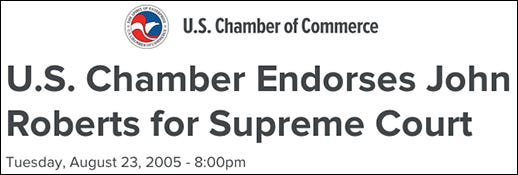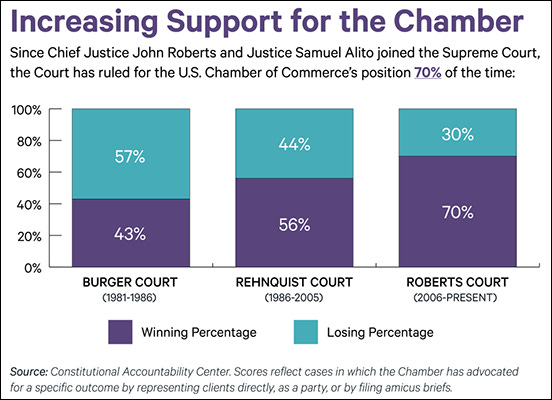
WASHINGTON - SEPTEMBER 29: U.S. President George W. Bush (L) watches while John Roberts (Center-L) is sworn in as Chief Justice of the U.S. by Associate Justice John Paul Stevens (R) as Roberts' wife, Jane Roberts, holds a bible during a ceremony in the East Room at the White House September 29, 2005 in Washington DC. Earlier in the day, the U.S. Senate voted in favor of Roberts becoming the 17th Chief Justice of the highest court in the U.S. (Photo by Joe Raedle/Getty Images)
When Roberts was nominated in ’05, few focused on his business fealty, but he was appointed because he represented corporate clients aiming to transform the court — which is exactly what he’s doing.
This week, the Supreme Court dutifully handed another victory to the US Chamber of Commerce, siding with the corporate lobbying group by invalidating the law that protected one of the nation’s chief financial regulators from White House meddling. It was another step towards making the Roberts Court the most corporate-compliant judicial body in modern American history.
In the ruling, the court struck down provisions that said a president could only fire the head of the Consumer Financial Protection Bureau for cause. The decision did preserve the agency’s right to exist, but as dissenting Justice Elana Kagan put it, the ruling “wipes out a feature of that agency its creators thought fundamental to its mission — a measure of independence from political pressure.”
Democratic Sen. Elizabeth Warren put it more bluntly, saying the Roberts Court “just handed over more power to Wall Street’s army of lawyers and lobbyists to push out a director who fights for the American people.”
The result is a hypocritical standard that favors the financial industry: a corporate president can instantly fire a CFPB chairman who assesses fines against Wall Street conglomerates that bankroll his political machine, but a future progressive president is still barred from firing a Federal Reserve chairman who doles out hundreds of billions of dollars of bailouts to corporations.
The CFPB ruling exemplifies the court’s sharp shift to right — a shift that relatively few even know about because media headlines about the court typically focus on social issues.
In an age when our public memory typically lasts about 15 minutes or less, even fewer seem to remember that this society-changing judicial shift is part of a longer-term plan that Roberts and his corporate allies have been methodically catalyzing for 15 years.
That may sound like hyperbole, but it is an understatement: In 2005, Roberts was nominated and appointed to the court precisely because he was seen by the business lobby as the most likely to engineer a jurisprudential shift in favor of corporations. He earned that reputation after a career in private practice representing the Chamber and the major corporate clients that he would go on to faithfully serve as chief justice.
The Lost History of A Corporate Chief Justice
If you only followed major rulings on social issues like abortion or immigration, or if you only followed Roberts’ public pronouncements, you might conclude that he is a moderate justice. But as this newsletter showed last week, he has presided over a court that is a corporate star chamber. Roberts himself reflexively sides with the US Chamber in most cases that the corporate lobbying group weighs in on.
That is exactly what the Chamber had hoped for way back in 2005, when Roberts was nominated to the court by President George W. Bush. In a span of just 5 years, Roberts would go from little-known corporate lawyer pitching in on the GOP’s effort to pilfer the Florida 2000 election to chief justice of the country’s highest court.
Weeks before Bush plucked Roberts out of obscurity, the Chamber launched what was billed as its first campaign for a Supreme Court nomination, including paid media, grassroots outreach and lobbying (this kind of campaigning is now routine, and powered by a well-financed GOP machine).
The Los Angeles Times reported that as part of its inaugural public campaign for a Supreme Court justice, the Chamber “forwarded to the White House its review of federal judges from each circuit, with ratings of each judge based on rulings that concern business.”
The Times noted that while liberals tended to focus on social issues, business groups had come to understand that the court wielded tremendous power over the economy:
The head of the National Assn. of Manufacturers, former Michigan Gov. John Engler, a Republican, has long argued that business should pay more attention to the courts.
“We can’t sit on the sidelines with the third branch of government” making so many decisions affecting business, he has said.
Patrick Cleary, a vice president of the manufacturers’ association, calculated that 80% of a federal judge’s civil cases “concerns issues that we care about” — liability, contract and employment law.
“All the hard-fought gains business has made in the executive and legislative branches could be lost” by the decision of a single judge, Cleary said.
Roberts was soon nominated to the high court despite having barely two years of experience as a judge.
“He Was The Go-To Lawyer For The Business Community”
Upon Roberts’ nomination, the Chamber publicly endorsed him in a glowing press release — one that notably did not mention that Roberts had represented the Chamber “in a battle over a Maine law designed to lower drug prices for state residents who lacked insurance coverage,” according to the Associated Press.
That wasn’t the only Roberts client with big business before the government.
In a story headlined “A Resume Strong on Business,” the Los Angeles Times noted that “while in private practice, Roberts represented numerous companies — Chrysler Corp., Litton Systems, Toyota Motor Corp., WellPoint Health Networks and NBC.” In addition, he helped major corporations circumvent the Americans With Disability Act, the Endangered Species Act, seatbelt laws, affirmative action statutes and antitrust strictures.
The Times noted that Roberts was nominated specifically because he would carry the water for corporations.
“He was the go-to lawyer for the business community. They are very comfortable with him,” Washington lawyer Thomas Goldstein told the newspaper. “He definitely is a friend of the chamber. Of all the candidates, he is the one they knew best.”
“Businesspeople are very enthused,” added C. Boyden Gray, a former White House counsel for Republican President George H.W. Bush. “I think the reason is he understands business issues…He has been immersed in them in private practice.”
Fast forward 15 years, and Roberts has delivered for his old corporate clients — his court sides with the Chamber far more than the previous two courts, which were already fairly conservative.
Of course, Roberts’ understated tone and his occasional swing vote on non-corporate issues give him the patina of moderation. But it is all part of Roberts’ long con. As The Nation’s legal analyst Elie Mystal compellingly argues, Roberts may occasionally shy away from some of the most extreme opinions of his conservative colleagues on the court, but it is only to maintain the image of judicial legitimacy as his court systematically tears up the social contract with understated-but-radical rulings that get little public attention.
“Unlike his conservative colleagues, Roberts, who is only 65 years old, understands that he will wield power for another decade or more,” Mystal writes. “Roberts rules like a man who plans to be here when Donald Trump is off somewhere hawking ‘America Used to Be Great’ hats at the ‘Donald J. Trump MOST Presidential Library and Bigly Golf Course.’ His rulings do not reflect a moderation of his philosophy; they reflect an unwillingness to be caught up by the lawlessness of this moment.”
Mystal rightly concludes: “John Roberts is not a failure of the conservative movement. He’s not a ‘squish’ or a RINO. He’s a rock-ribbed Republican jurist who is doing the long and patient work of defending corporate America and the white male patriarchy.”
That work is not the scheme of one lone rogue jurist — it is part of a long-term blueprint crafted by the most powerful corporate forces in Washington.






